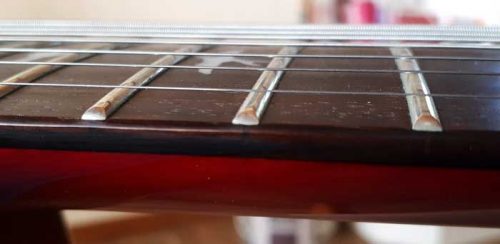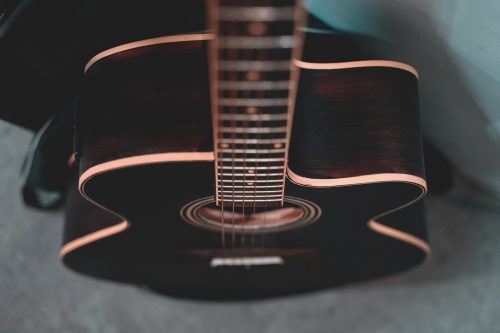Heavy guitar strings produce a loud sound and stay in tune for an extended period but playing the guitar with heavy strings is challenging and requires finger strength.
Light guitar strings are generally quieter than heavy strings and quickly go out of tune. However, they are effortless and comfortable to play.
Guitar strings are available in various gauges, which refers to their thickness. Each string size has its benefits and limitations depending on the guitarist’s playing style.
‘Should I use a light or heavy string for my guitar?’ was also the first question I had to ask myself when I started playing.
It was difficult because the choice between the two is a tradeoff, so it is essential to make the right one.
To find the ideal string gauge for your guitar, it is essential to understand the characteristics of every gauge. So after trying both heavy and light strings and various trials and errors, I was able to find the strings that complimented my playing style.
In this article, I will discuss the characteristics of both light and heavy guitar strings in detail and enlist their pros and cons. By the end of the article, you will be able to choose the correct string gauge to enhance your guitar playing!
The article discusses both the strings in detail, including the four main factors that you should consider before making a decision:
- How are the four main factors, sound, playability, tuning and durability, affected by heavy and light strings?
- Which guitar strings are better for beginners?
- Which guitar strings are easier to play?
- Pros and cons of both heavy and light strings.
- How to choose between light and heavy strings.
Heavy Vs Light Guitar Strings
| Heavy Strings | Light Strings | |
| Volume | High volume | Lower volume |
| Sound Quality | Better quality | Clear sound |
| Playability | Difficult to play | Easier to play |
| Tuning | Stable | Unstable |
| Durability | Does not break easily | More likely to break |
Sound: Heavy Vs Light Guitar String
Heavy strings produce a loud and more focused sound. Other than that, the heavy strings also have sounds of higher quality.
Light strings produce a soft but clear sound. In addition, they are easier to play, and you can use light strings to play fast tunes.
When you pluck a heavy string, it contains a more significant amount of kinetic energy than lighter strings, which is transferred to the soundboard and leads to a louder sound.
Increasing the thickness of the gauge will add more tension to the strings, which leads to a better quality of the sound produced. Moreover, thick strings are more suitable for producing low-end frequencies (bass).
As opposed to that, the volume of the sounds produced from the lighter strings is not as loud as the heavy ones, but they are much clearer.
If you are a heavy metal music player and require deep and heavy tones, you should stick to heavy strings because they have more tension and produce deep and loud sounds.
Playability: Heavy Vs Light Guitar String
Heavy strings have low playability and are challenging to fret because as they are thick and have more tension, they require way more finger strength to bend and press.
Light strings have high playability because they have low thickness. Therefore, they can bend easily and make the player feel more comfortable playing.
The thickness of the string has a significant impact on how easy and comfortable it feels to play your guitar.
Heavy strings make you work harder because they require a lot more from the player to play sounds. In addition, these strings create more tension, so they are harder to fret and bend and more challenging to hold for an extended period.
On the other hand, light strings are much more friendly on the fingers as they are easier to bend. This comfort makes you feel that the guitar is faster to play.
If you are a beginner or someone with less experience, you should go for light strings because they are easier to play and require lower finger strength.

Heavier and thicker strings are usually harder to play but can produce louder sound.
Tuning: Heavy Vs Light Guitar String
Lighter strings have tune instability as they can quickly go out of tune because they hold less tension.
Heavy strings have tune stability and can stay tuned for an extended period. As a result, the guitar does not require tuning often.
When you tune a guitar, you expect it to stay tuned, so you do not have to spend much time tuning it. However, Light strings have tune instability because they can easily be played with and manipulated. Thinner strings have a greater chance of becoming slack when they are down-tuned.
The heavy strings create and hold more tension because of which it isn’t easy to get out of tune when you are playing.
Even when you constantly play the guitars with heavy strings, they do not lose their tension. This is a significant benefit because you do not have to tune your guitar again and again!
Suppose your guitar is constantly going out of tune. In that case, it might help by increasing the thickness of your strings, creating more tension and allowing the guitar to stay in tune.
Durability: Heavy Vs Light Guitar String
Heavy strings are durable and last for an extended period without slacking. In addition, these strings are thick, so you cannot break them easily.
You can break light strings easily because they are thin, so they’re not durable.
Guitars are a long-term and expensive investment, so your choices regarding the strings must be worth the value.
Light strings have numerous benefits, but they have lesser durability. Like they are easy to bend and fret, they are also easier to break. In addition, light strings have lower tension, making them more likely to break easily.
On the other hand, heavy strings do not break easily and are more likely to last longer. So if you have a problem breaking your strings often, going for heavier strings might solve it!

Lighter and thinner strings are easier to play but can go out of tune faster and break easily.
What Is a Heavy Guitar String?
A guitar string is considered heavy or thick based on the thickness of its gauges. Gauges are measured in 1/1000th of an inch.
The heavy string category lies between 0.14 on an acoustic guitar and 0.12 on an electric guitar.
The larger the gauge, the heavier the string is going to be. A heavy string is hard to play but produces loud sounds.
They produce deep and full sounds and are usually more prevalent in jazz and metal music.
What Is a Light Guitar String?
A light guitar string has gauges ranging from 0.012 to 0.053 on acoustic guitar and 0.010 to 0.046 for electric guitar.
Light guitar strings are quieter but easier to play. However, they are considered less durable because they can break easily due to their fragile nature.
Which Guitar Strings Are Better for Beginners?
Light guitar strings are more suitable for beginners than heavy ones; they are gentler on the fingers. In addition, the guitar feels more comfortable playing with lighter strings.
As a beginner, you like to learn and experiment with different chords, so having light strings will make practicing the chords easier. In addition, this smoothens the learning curve as light strings are more straightforward to fret and bend than heavy strings, which can be challenging to play for inexperienced fingers.
So if you are looking for the right set of strings as a beginner, it is always better to go for lighter strings. These strings are less taxing on your fingers and will help you start from the basics. And you can always go up a gauge once you have learned to play!
Which Guitar Strings Are Easier to Play?
Light guitar strings are easier to play than heavy ones as they require less effort to fret and bend and can be played with less finger strength.
Light guitar strings are considered to be easier to play because they are softer on the guitar neck and are less demanding of the left hand to bend and fret each note. Hence it allows the guitarist to play fast and less effortlessly.
Are Lower Gauge Strings Easier to Bend?
Lower gauge strings are easier to bend because they usually have lower tension than heavy strings.
Light strings are considered to be easier to bend and press because they require less strength and effort from the fingers of the player. However, if light strings were this easy to play, why would anyone opt for heavy strings? The answer to this lies further on in the article.

Lighter and thinner strings are easier for any techniques like slides and bends.
Do Heavier Guitar Strings Sound Better?
Heavy guitar strings are louder, more focused and have a better sustain. All three of these factors together lead to great sound! However, you can have different views on deciding which kind of string sounds better.
Heavy strings have a low vibrational frequency, giving a fuller, deeper, and warmer sound than light strings.
The main impact of the thickness of the string is on the volume of the sound. The heavy strings have tremendous kinetic energy, producing a louder sound.
If you are looking for dark and deep tones like metal, you must go for heavy strings with robust sound.
Do Heavier Strings Stay in Tune for Longer?
Using a heavy guitar string for your guitar means you don’t have to tune your guitar repeatedly because heavy guitar strings are more likely to stay in tune for a longer period.
If you play the guitar often, you do not want to be wasting your time adjusting the tune every time you want to play a sound. Heavy strings help you avoid this and save your time by providing excellent tune stability.
Heavy Guitar Strings Pros & Cons
Pros of Heavy Strings
- They produce a louder sound.
- They have better tuning stability.
- They have a fuller and warmer tone.
- They are less likely to break.
Cons of Heavy Strings
- They are harder to play.
- They require greater finger strength from the player.
- They are painful to bend and press.
- They are too complicated for beginners to learn.
- They are harder to play with speed.
Light Guitar Strings Pros & Cons
Pros of Light Strings
- They are easy to play.
- They are easier to fret and bend.
- More suitable for small guitars.
- They produce a clearer and more defined sound.
Cons of Light Strings
- They are quieter as compared to heavy string guitars.
- They are more likely to break easily.
- They have tune instability.
Which Guitar Strings Should You Use?
To choose the most suitable guitar string for yourself, you should identify your style, experience level, finger strength, etc. Then, cross-check with the characteristics of heavy and light strings.
Whichever string matches your requirements the most is the string you should use.
Choose Light Strings if:
- You are a beginner
- You require a quiet, clear sound.
- You have low finger strength
- Prefer durability
Choose Heavy Strings if
- You require a loud sound
- You break strings easily
- You have experience and finger strength
Final Thoughts
There is no ideal string that is best for all guitarists. I can’t pinpoint a string for you and declare that it is the best one because that is just not right. Everyone has a different requirement, and no one string fits all.
Once you have developed a detailed understanding of the characteristics and pros and cons of light and heavy strings, we come back to the fundamental question of which string you should use.
In conclusion, choosing the right guitar strings is a long journey, not a one-time decision. You have to try different strings until you find the one that suits you the most, and knowing all the details you just learned will help you find your path.





